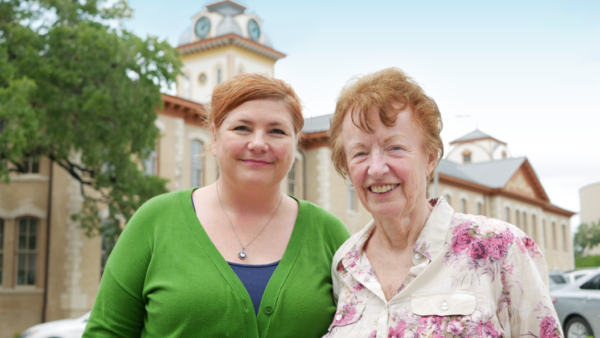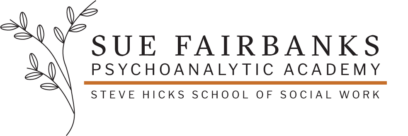By Allie Long & Kate McKerlie
The Texas Institute for Child and Family Wellbeing is excited to announce the creation of the Sue Fairbanks Psychoanalytic Academy, funded through a generous endowment by Sue Fairbanks and directed by Dr. Tina Adkins.

Tina Adkins, a Research Assistant Professor at TXICFW, has seen first-hand how incredibly important caregivers are in a child’s life. Early in her career, Tina worked alongside social workers as a CPS caseworker. “The experience of witnessing traumatized youth come in and out of care has informed my work ever since,” said Tina.
Research has shown that one of the most beneficial ways to help a child heal from trauma is by focusing on their relationships with their caregivers. When it comes to foster and adoptive children—a population that is particularly vulnerable to trauma and upheaval—this is especially vital. However, foster and adoptive caregivers often lack the access to support and the resources necessary to help regulate behavior or improve relationships for these children in their lives.
After graduating from the Anna Freud Centre in London with a Ph.D. in Theoretical Psychoanalysis, Tina combined her previous experience working in the child welfare field with her understanding of psychoanalysis and applied it to the creation of an intervention called Family Minds. Family Minds is a short psychoeducational program for foster and adoptive parents that is based on attachment theory, neuroscience and psychoanalytic theory.
The main goal of Family Minds is to help parents mentalize and practice reflective parenting. “When a caregiver is able to imagine what their child is feeling and thinking while concurrently reflecting on their own thoughts and feelings about their child, this helps that child develop a solid sense of self, a more secure attachment, and an ability to cope with the world and those around them,” said Tina.
Fast forward to a few years later, Tina met Sue Fairbanks – a longtime supporter and graduate of the Steve Hicks School of Social Work – at a Steve Hick’s School of Social work fundraising event. Sue was so intrigued by Tina’s work that she generously agreed to fund Tina’s research through the Fairbanks Psychoanalytic Research Collaboration.
It was also important to Sue that the collaboration provide some sort of professional development opportunity for practitioners. Sue has been funding the “Sue Fairbanks Lecture in Psychoanalytic Knowledge,” hosted by the SHSSW for a number of years, but other than that, the school does not offer its students any particular training or class in Psychoanalytic Theory.
Sue always wanted to provide more formal psychoanalytic education and training to social work students. “I am incredibly passionate about the continually evolving body of knowledge behind psychoanalysis,” said Sue. “Through my years as a practitioner, I believe that psychoanalytic training can serve as a vehicle for a deeply compassionate exploration and understanding of human suffering, as well as a way for other practitioners— be it social workers, psychologist, or clinicians — to address the healing of that suffering in various settings.”
Really? Social Work Practice & Psychoanalysis!?!
If you hear the name “Freud” paired with the term “psychoanalysis,” what is the first thing that comes to mind? Perhaps these words might bring back vague recollections from a Psychology 101 class, or the images of a cigar and a couch. While there is certainly some truth to these associations, what many people fail to remember are the significant ways in which psychoanalytic theory created a ripple effect that continues to influence the social sciences to this day.
Take social work, for example: “It comes as a surprise to a lot of people, but some of the practices at the heart of social work are heavily influenced by theories and structures set forth by psychoanalysts from the nineteenth and twentieth centuries,” said Tina.
Although this notion might seem sensational at first, psychoanalysis is really about providing people with the tools to understand the mind, emotions and family systems. When viewed from this lens, there are many ways in which social work practitioners can apply this theoretical foundation to ongoing work in the field.
To meet the potential of helping practitioners while further applying her work, Tina developed a widely successful series called “Psychoanalytic Lunch & Learns” that have been offered to the public and practitioners as continuing education opportunities since 2017. Through this experience, it became apparent that there was both an interest and a gap in the social work community for psychoanalytic training.
The Sue Fairbanks Psychoanalytic Academy
Originally inspired by the popular Lunch & Learn sessions, the Sue Fairbanks Psychoanalytic Academy will be expanding its initial research and educational outreach by weaving together psychoanalytic theory, social work values and clinical practice.
The Academy’s research content and trainings align strongly with the Texas Institute for Child & Family Wellbeing’s foundational focus on relationships being central to the health and well-being of children and their families, which is why the Academy will be housed within TXICFW. Eventually, the Academy will design and implement community workshops and post-graduate certificate courses. The goal of the Academy will be to design trainings and courses based on psychoanalytic theory as seen through a social work lens, and will focus on such topics as healthy attachment, and mentalizing. Another goal of the Academy is to become a hub of support for community members as well as professional social workers who want to incorporate psychoanalytic theory and techniques into their practice.
“I am incredibly grateful for meeting Sue, and for her continued and expanded support. This Academy has been a long time coming. We couldn’t be more excited to implement a psychoanalytic framework that will help to support parents, professionals, and social workers increase child resilience and strengthen family relationships,” said Tina.
